What Tea is Good for Liver and Kidneys
When looking to support your liver and kidneys, certain teas can be a beneficial part of your diet. Here's a list of teas that may have positive effects on these vital organs:
- Green Tea: Rich in antioxidants like catechins, green tea is thought to enhance liver function and protect against liver disease.
- Dandelion Tea: Often used as a natural diuretic, dandelion tea helps your kidneys clear out salt and water and may improve liver detoxification processes.
- Milk Thistle Tea: Silymarin, a compound found in milk thistle, is commonly associated with liver health. It may help to regenerate liver cells and protect against damage.
- Turmeric Tea: Curcumin, the active ingredient in turmeric, has anti-inflammatory properties which may benefit both liver and kidney health.
In addition to the types of tea, consider these preparation tips for maximum benefits:
- Brewing: Steep your tea for at least 5 minutes to allow the active compounds to infuse into the water.
- Frequency: Incorporating one to two cups of these teas into your daily routine might offer the best results.
- Quality: Opt for organic teas when possible to avoid consuming pesticides that could harm your liver and kidneys.
Finally, while these teas can support liver and kidney health, they should not replace treatments prescribed by health professionals. If you have existing health conditions, consult with your doctor before adding new herbal teas to your diet.
Bestsellers
Herbal Teas and Their Properties
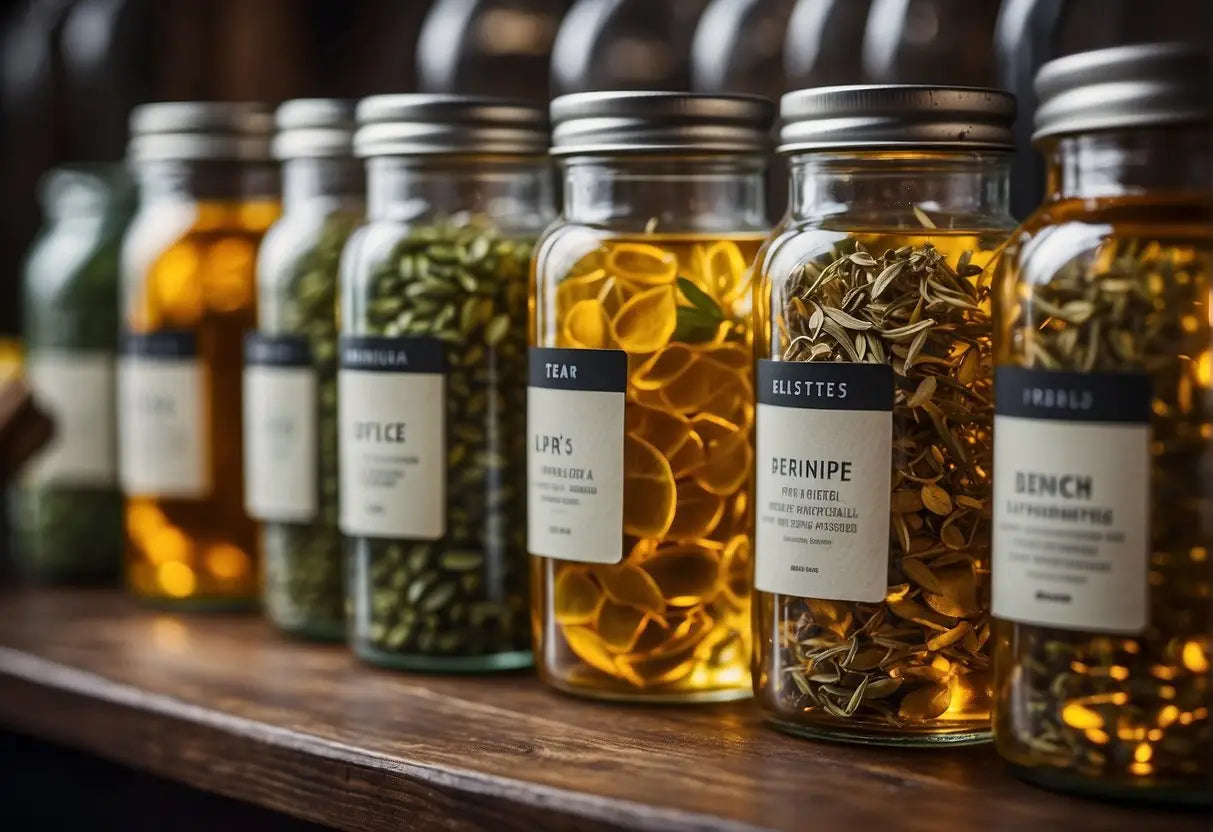
Herbal teas can offer a range of benefits for your liver and kidneys, due to their natural compounds and antioxidants. Each specific tea comes with its own set of properties that may support organ health.
Green Tea
Green tea is rich in antioxidants called catechins, specifically epigallocatechin gallate (EGCG). EGCG has been studied for its potential to support liver function and protect against liver diseases.
- Liver: May aid in reducing fat deposits and liver inflammation.
- Kidneys: Antioxidants help in reducing oxidative stress and improving kidney function.
Dandelion Tea
Dandelion tea acts as a diuretic, increasing urine production. This aids in flushing out toxins from your kidneys and liver.
- Liver: Helps in bile production, which can improve liver detoxification.
- Kidneys: Supports the removal of waste and excess water, reducing the burden on kidneys.
Milk Thistle Tea
Milk thistle contains silymarin, a group of compounds said to have hepatoprotective effects.
- Liver: It may help regenerate liver cells and protect against damage from toxins.
- Kidneys: Silymarin also displays protective and reparative properties for kidney cells.
Turmeric Tea
The active ingredient in turmeric tea is curcumin, known for its anti-inflammatory properties.
- Liver: Curcumin is studied for its ability to improve liver function by reducing liver enzyme levels.
- Kidneys: It may decrease the chances of kidney inflammation and kidney stones.
Peppermint Tea
Peppermint tea contains menthol, which is beneficial for digestion and can have a mild soothing effect on the kidneys and liver.
- Liver: Can relax bile ducts for improved bile flow and help in liver enzymes regulation.
- Kidneys: Menthol’s antispasmodic properties may assist in relieving minor kidney discomfort.
Detoxification Through Tea
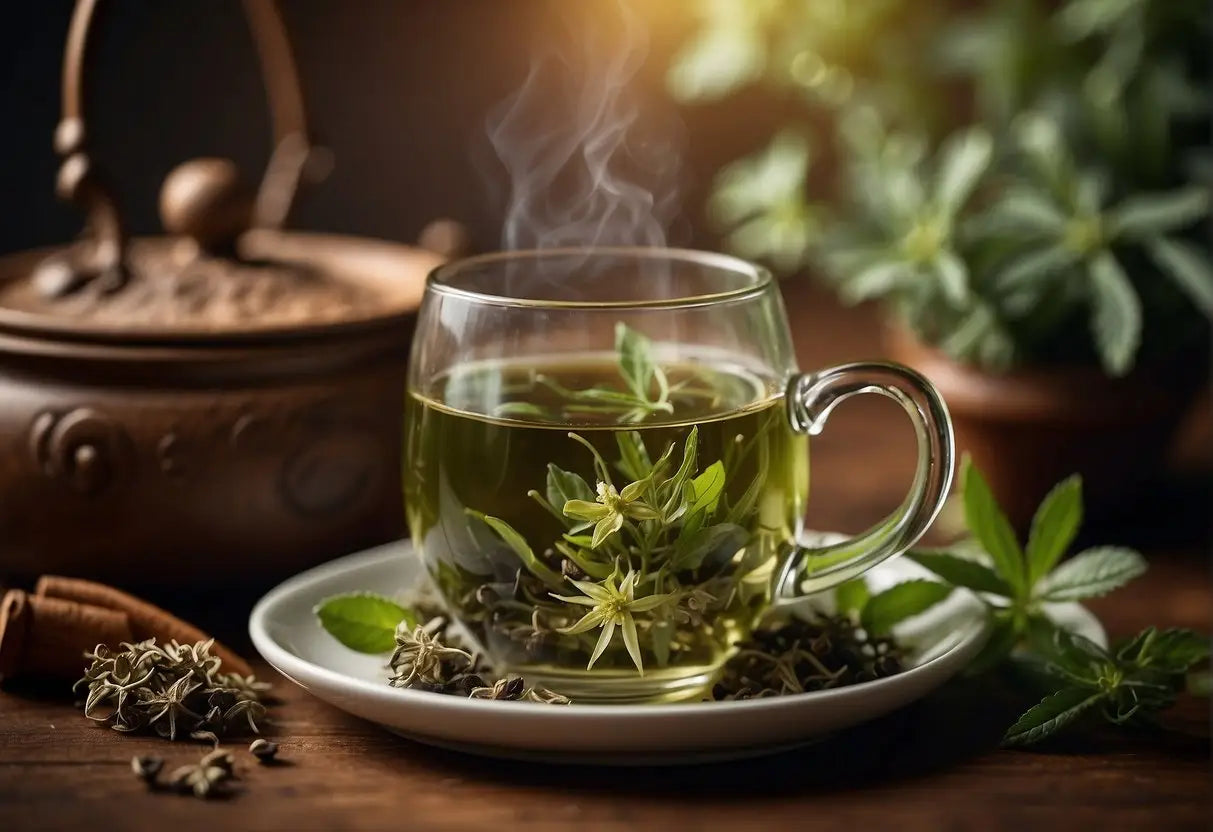
When considering teas for your liver and kidneys, focus on those with properties that support detoxification processes. Green tea, for example, is rich in antioxidants such as catechins, which may help in protecting the liver from toxins.
Green Tea:
- Antioxidants: High in catechins
- Benefits: May enhance liver function
Dandelion Tea:
- Rich in flavonoids
- Traditionally used to support kidney health and as a diuretic to increase urine production, aiding in the removal of waste and excess water.
Milk Thistle Tea:
Lao Ban Zhang
- Contains silymarin, a group of compounds said to have antioxidant and anti-inflammatory properties.
- Often used to detoxify the liver and improve liver health.
Chamomile Tea:
- Mild diuretic effects
- Can help gently remove water and waste from the body.
Remember, moderation is key. Excessive consumption of even beneficial teas could have negative effects. Always ensure that you stay hydrated with water as well. Consult with a healthcare provider before significantly changing your dietary habits or to address specific health concerns.
- Hydration: Maintain adequate water intake
It's important to note that while these teas may support the liver and kidney functions, they are not a cure for medical conditions. A balanced diet and healthy lifestyle are essential for optimal organ health.
Optimal Consumption Patterns
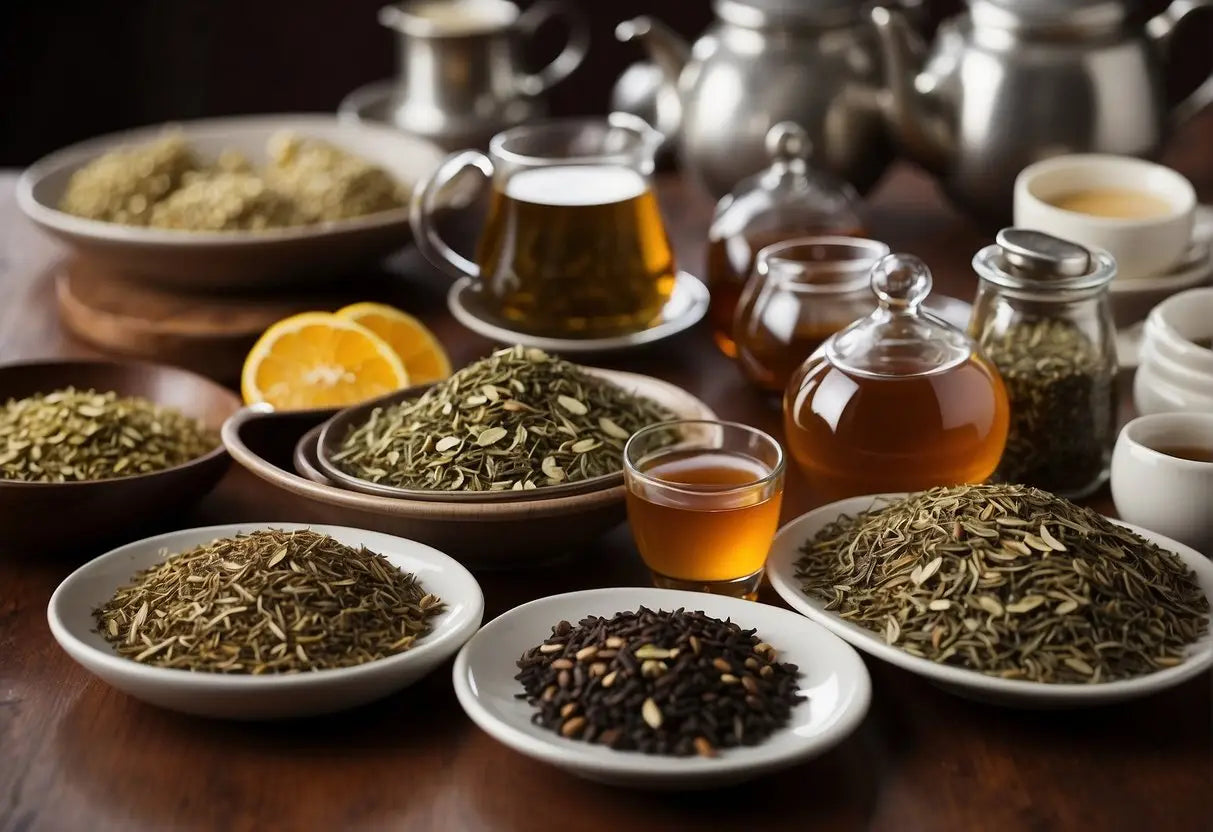
When incorporating tea as part of your diet for liver and kidney health, moderation is key. Aim for about 1-3 cups per day to maintain a balance. More isn’t always better; excessive consumption can be counterproductive.
Green Tea: Start with 1 cup a day, preferably in the morning, to boost your antioxidant intake, which may be beneficial for your liver.
Dandelion Tea: For kidney health, dandelion tea can act as a diuretic. Drink 1 cup, but not late in the day to avoid disrupting your sleep with frequent bathroom trips.
Chamomile Tea: While calming, ensure to limit intake to 1-2 cups daily. Chamomile is gentle on the kidneys and may help with digestion, indirectly supporting the liver.
Preparation and Timing
- Brewing Time: Steep your tea between 3-5 minutes, as overbrewing can lead to increased toxin levels that your kidneys have to filter out.
- Water Temperature: Use hot but not boiling water, particularly for green tea, to avoid releasing too many tannins, which can be hard on your liver and kidneys.
Mindful Consumption
- Organic Options: Consider organic teas to reduce pesticide exposure, which can add unnecessary stress to both the liver and kidneys.
- Hydration: Always balance tea drinking with water consumption. Tea shouldn't replace your regular water intake.
- Avoid Additives: Skip the sugar or milk to keep your liver and kidneys from having to process extra substances.
By adhering to these guidelines, you can enjoy the benefits of tea for your liver and kidneys responsibly.
Potential Risks and Considerations
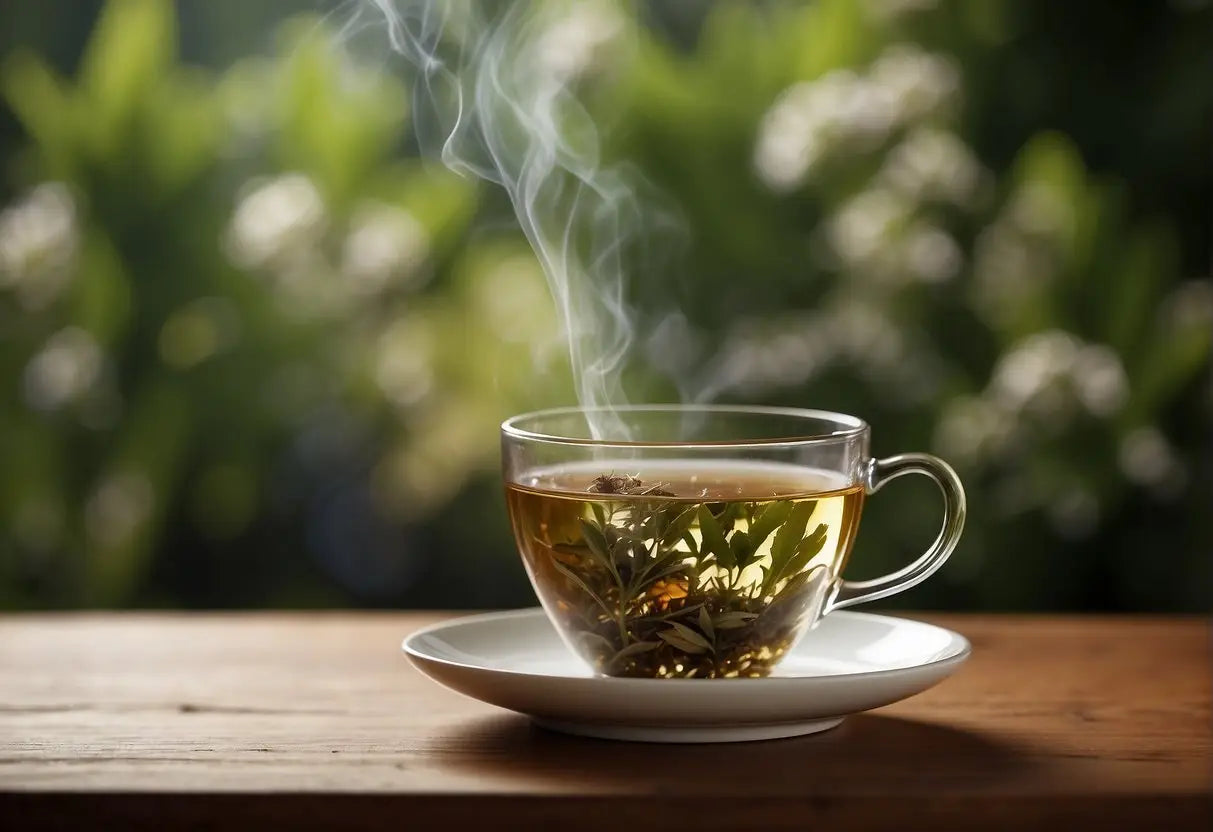
When selecting teas for liver and kidney health, it's important to understand the potential risks involved and considerations to keep in mind.
-
Herbal Interactions: Some teas contain herbs that may interact with prescription medications. Be sure to consult your healthcare provider to avoid any negative interactions.
-
Possible Contaminants: Teas, especially those grown in unregulated environments, might contain heavy metals or other contaminants. Choose teas from reputable sources with good manufacturing practices.
-
Caffeine Content: While some teas are beneficial, they may also contain caffeine, which in excess can be hard on your kidneys and may disrupt your sleep patterns.
Recommended Consumption:
- Limit intake of caffeinated teas.
- Opt for organic varieties to minimize exposure to pesticides and chemicals.
| Herb | Risk Factor | Kidney Consideration | Liver Consideration |
|---|---|---|---|
| Comfrey | High | Potentially toxic | May cause liver damage |
| Pennyroyal | High | Harmful if ingested | Can induce liver failure |
| Kava | Moderate to High | Risk of kidney damage | Potential liver toxicity |
- Allergic Reactions: Be aware of potential allergic reactions to certain herbs or plants used in teas.
By considering these risk factors and proceeding with caution, you can make informed decisions regarding tea consumption for your liver and kidney health. Always prioritize safety and check with healthcare professionals if in doubt.
Frequently Asked Questions
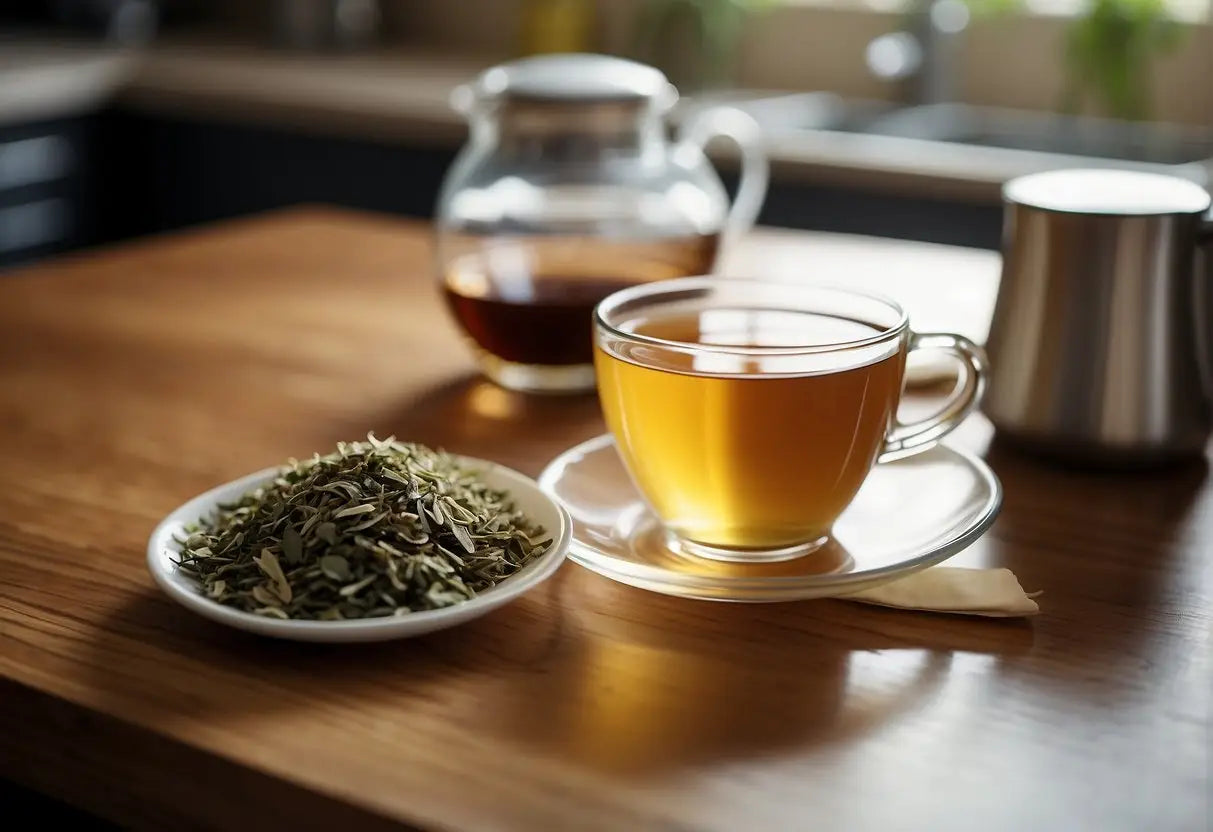
In this section, you'll find answers to common questions about teas that may benefit liver and kidney health. Each type of tea has its own potential benefits based on its composition and active ingredients.
Which teas are known to assist in detoxing the fatty liver?
Green tea is rich in antioxidants such as catechins and may aid in improving liver function and reducing fat deposits in individuals with fatty liver disease. Dandelion tea is also believed to help detoxify the liver by promoting liver function.
What varieties of tea can support kidney function?
Nettle tea and dandelion tea are often recommended to support kidney function. They are diuretic in nature, which means they can help increase urine production and flush out toxins from the kidneys.
How does chamomile tea benefit the liver and kidneys?
Chamomile tea contains antioxidants that may support liver and kidney health by reducing inflammation and oxidative stress. It's also gentle on the digestive system and may help soothe the kidneys and liver.
What are the best options for herbal tea that aid in liver repair?
Milk thistle tea and turmeric tea are known for their liver-supporting properties. Milk thistle is traditionally used to protect the liver, while turmeric contains curcumin, an anti-inflammatory compound that might aid liver repair.
How can I naturally enhance the health of my liver and kidneys?
Drinking teas such as green tea, ginger tea, or cranberry tea may help support the functioning of your liver and kidneys. Maintaining hydration, following a balanced diet, and monitoring your intake of alcohol and processed foods also contribute to overall health.
Are there specific herbs recommended for cleansing both the liver and kidneys?
Certain herbs like dandelion, milk thistle, and burdock root are often recommended for cleansing because they have properties that might support both liver and kidney health. Look for teas that contain these herbs to potentially aid in detoxification.
← Older post Newer post →











